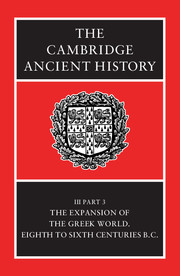Book contents
- Frontmatter
- Contents
- List of maps
- List of text-figures
- Preface
- 36a The Greeks in the Near East
- 36b The Greeks in Egypt
- 36c Cyprus
- 36d The Cypriot syllabary
- 37 The colonial expansion of Greece
- 38 The western Greeks
- 39a The eastern Greeks
- 39b Crete
- 39c Cretan Laws and Society
- 39d Euboea and the Islands
- 40 Illyris, Epirus and Macedonia
- 41 Central Greece and Thessaly
- 42 The Peloponnese
- 43 The growth of the Athenian state
- 44 The Tyranny of Pisistratus
- 45a Economic and social conditions in the Greek world
- 45b The material culture of Archaic Greece
- Chronological Table
- BIBLIOGRAPHY
- Index
- References
39d - Euboea and the Islands
Published online by Cambridge University Press: 28 March 2008
- Frontmatter
- Contents
- List of maps
- List of text-figures
- Preface
- 36a The Greeks in the Near East
- 36b The Greeks in Egypt
- 36c Cyprus
- 36d The Cypriot syllabary
- 37 The colonial expansion of Greece
- 38 The western Greeks
- 39a The eastern Greeks
- 39b Crete
- 39c Cretan Laws and Society
- 39d Euboea and the Islands
- 40 Illyris, Epirus and Macedonia
- 41 Central Greece and Thessaly
- 42 The Peloponnese
- 43 The growth of the Athenian state
- 44 The Tyranny of Pisistratus
- 45a Economic and social conditions in the Greek world
- 45b The material culture of Archaic Greece
- Chronological Table
- BIBLIOGRAPHY
- Index
- References
Summary
Euboea, 700–500 B.C.
If the end of the Lelantine War (CAH III.1, 760–3) shed the light of peace on a troubled Euboea, it brought none of any kind to its history. We are left with a Chalcis still stubbornly unyielding of any archaeological truth, an abandoned Lefkandi, a prospering New Eretria and the other cities, so far as we know, much as they were before. But none of them, not even Eretria, figures more than occasionally and usually accidentally in anything that can be called the mainstream of Greek history, nor can much be said of their domestic affairs.
The aristocracies under which the war had been fought, and won or lost, were not unaffected by the challenges that faced aristocracies elsewhere and before 600 a tyrant, Tynnondas (an interestingly Boeotian name) imposed himself on the ‘Euboeans’ (Plut. Sol. 14) and others, Antileon and Phoxus, on Chalcis (Arist. Pol. 1304a, 1316a), but Tynnondas is remembered only for his name, Antileon and Phoxus for their departures not their presence (one was succeeded by an oligarchy, the other by a democracy). But what Aristotle, our source for both, meant by ‘oligarchy’ or ‘democracy’ is unclear. The only firm fact is that when the Athenians won a famous victory over the Chalcidians about 506 and, in effect, took over Chalcis, they settled 4,000 of their citizens on the lands of the Hippobotae, the ‘Horse-breeders’, a name that has a sufficiently traditional aristocratic flavour to suggest that whatever tyrannies, oligarchies or democracies had gone before did little to shake Chalcidians from their inherited ways (Hdt. V. 74–7).
- Type
- Chapter
- Information
- The Cambridge Ancient History , pp. 249 - 260Publisher: Cambridge University PressPrint publication year: 1982

